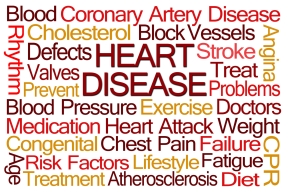The Facts About Coronary Artery Disease
From an interview with
Dr. Joseph Marmora
McLeod Cardiology Associates – Little River
Coronary artery disease (CAD) is the single most common cause of death in the developed world, responsible for about 1 in every 5 deaths. About 1 in 20 adults in the United States age 20 and older have CAD – that’s 18.2 million Americans. McLeod Interventional Cardiologist Dr. Joseph Marmora tells us more about this nationwide health issue.
“Chronic Stable Coronary Artery Disease results in the buildup of plaque in coronary arteries over time. This causes a supply-demand mismatch in the flow of blood to the heart muscle.
Symptoms are typically exertional in nature, reflecting the supply and demand mismatch in the flow of blood to the heart muscle. In other words, when you exert yourself, your heart needs more blood flow. However, the buildup of plaque in the arteries prevents sufficient supply to meet that demand. Common symptoms are exertional chest pain and shortness of breath.
The risk factors for Coronary Artery Disease are age, high blood pressure, high cholesterol, diabetes, smoking, family history, and obesity.
Treatment options range from medications, to stents, to open heart surgery. Oftentimes, we employ a combination of these strategies. A thorough evaluation with a cardiologist will dictate which strategy is appropriate.
Recovery from a stent procedure is on the order of days to weeks, usually. Recovery from open heart surgery is much lengthier, and certainly on the order of months to even over a year.
Preventing coronary artery disease is all about ensuring the risk factors around coronary artery disease are well controlled. This often involves medications, but always involves lifestyle changes. Adhering to a heart-healthy diet, participating in regular cardiovascular exercise and weight loss efforts are crucial.
A heart healthy diet is one that emphasizes vegetables and fruits, whole grains, lean poultry and oily fish such as salmon and tuna, which are high in omega-3 fatty acids.
People who smoke certainly are at increased risk for coronary artery disease and heart attacks. Smoking cessation is crucial.”
Fast Facts About Heart Disease Risk Factors in South Carolina
- 18% of adults in South Carolina are smokers.
- More than 2 out of every 3 adults in South Carolina are overweight or obese.
- Half of adults in South Carolina do not get the recommended amount of physical exercise.
- Nearly 2 out of every 5 adults in South Carolina has high blood pressure.
- About 1 out of every 7 South Carolina adults has diabetes.
- High cholesterol affects 37% of South Carolina adults.
To learn more, speak with an interventional cardiologist near you.
-
McLEOD REGIONAL MEDICAL CENTER FLORENCE
843-777-2000 -
McLEOD DARLINGTON
843-777-1100 -
McLEOD DILLON
843-774-4111 -
McLEOD LORIS
843-716-7000 -
McLEOD SEACOAST
843-390-8100 -
McLEOD CHERAW
843-537-7881 -
McLEOD CLARENDON
803-433-3000



-
McLEOD REGIONAL MEDICAL CENTER FLORENCE
843-777-2000 -
McLEOD DARLINGTON
843-777-1100 -
McLEOD DILLON
843-774-4111 -
McLEOD LORIS
843-716-7000 -
McLEOD SEACOAST
843-390-8100 -
McLEOD CHERAW
843-537-7881 -
McLEOD CLARENDON
803-433-3000
 Find a Doctor
Find a Doctor  Locations
Locations  Services
Services 